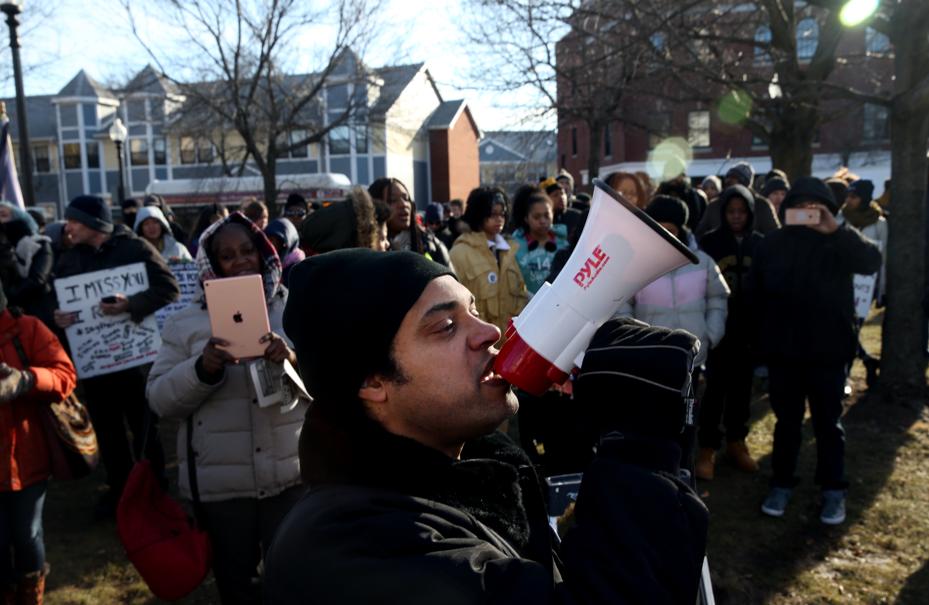
About 150 men, women, and children of many backgrounds marked Martin Luther King Jr. Day by marching through Dorchester on Monday afternoon.
Chanting messages such as, “Old Jim Crow, new Jim Crow, this racist system’s got to go,’’ the diverse group walked from Codman Square to Fields Corner, voicing opposition to racial and economic inequality, police brutality, and mass incarceration of black men.
The Martin Luther King Day March for Justice was organized by a coalition of community groups led by Mass Action Against Police Brutality, according to Brock Satter, a member of Mass Action.
Satter said the march was meant to send a message that the struggle for civil rights persists.
“We need to continue Dr. King’s example,’’ he said, “especially of taking to the streets and building a mass movement. . . . We need to go back to those methods, that course of action, to vote with our feet, and to stand up against racism and injustice, even if it comes from the police or the courts.’’
Several speakers at the demonstration were mothers of men killed by police, including Hope Coleman, whose 31-year-old son, Terrence Coleman,was fatally shot by Boston officers on Oct. 30. Coleman and the other mothers disputed police accounts of their sons’ deaths.
On the day he was killed, Coleman had called for an ambulance to take her son, who suffered from schizophrenia, to the hospital. Instead, he was shot to death by police who said he’d turned on the EMTs with a knife.
Coleman insisted that her son did not have a knife and needed to go to a hospital only because he had stopped taking the medication prescribed for his condition.
“He wasn’t stupid,’’ she said through sobs, as tears rolled down her face. “He just had a problem. And I called for help, and now I have no son. I regret. . . calling,’’ she said. “I didn’t think they’ll kill him.’’
Boston police Commissioner William B. Evans and James Hooley, chief of Boston Emergency Medical Services, have disputed Coleman’s account of the incident.
While some came to the demonstration grieving recent losses, others were continuing a long tradition.
Demonstrator Robert Traynham, 80, who has been a Boston school bus driver for four decades, said he has been marching for civil rights since 1955.
“We need people to come into the streets and get involved in what’s going on,’’ he said. “That’s the only way we can get power; we’ve got to band together.’’
Some marchers held signs with messages such as, “Capitalism depends on oppression of the masses,’’ “Stop killing peaceful civilians,’’ and “Reform can’t stop the violence of the cops.’’
Somerville resident Robert Brutus grasped a sign that read, “Am I next?’’ Brutus, 33, said he had not made the sign but had selected it from a pile brought by another demonstrator.
“I think that it means that if the police can get away with killing people — and I see it happening to other people, who are mostly black men — then it could happen to me,’’ he said.
Brutus, who is black, said he has not experienced police bias since moving to the Boston area, but when he previously lived in Washington, D.C., he said he was stopped by an officer after a neighbor reported him as a “suspicious person,’’ possibly because he was wearing a hooded sweatshirt.
He said such experiences are common for black men, but they are not alone in facing bias.
“I think that we’re all a part of some group that is negatively stereotyped in some way, including white men,’’ he said. “There’s this stereotype that white men are racists, and so then, whenever we’re in a situation where we might be stereotyped, that creates anxiety.’’
Jeremy C. Fox can be reached at jeremy.fox@globe.com. Follow him on Twitter @jeremycfox.


 PREVIOUS ARTICLE
PREVIOUS ARTICLE